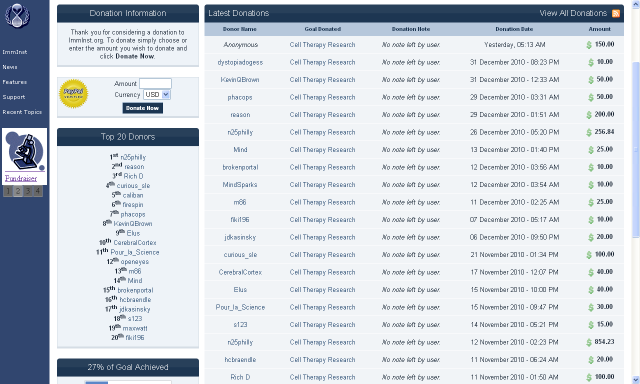Hey Pour_la_Science,
I leave the researchers to answer more if they like, but they shouldn't have to defend what caliban writes in a newsletter to drum up more donations.

So very superficially:
My words were chosen for dramatic effect. Still, I stand by them for the following reasons: The question of what 'Alzheimners' entails is still not settled. Early onset Alzheimer's disease is generally autosomal dominant but genetically heterogeneous. However, what we find in the genetic conditions is simply a flaw in the management of that mean those afflicted get the affected by protein debris faster. Other forms of Alzheimer's are not genetically linked and its jolly difficult to diagnose Alzheimers while people are still alive: decreased amyloid-b peptides and increased tau concentration in CSF are generally taken as a sign of Alzheimers, but there is no clear link with psychological/cognitive impairment! For a while, we thought, that there may be some Alzheimers-protection in the oldest old, but event that assumption has now been questioned (1)/(2).
However, does it really matter? Old people get dementia! Does it matter if its from Alzheiners or LBD or some other factor related to proteolysis going wrong? Sometimes researchers working with the oldest old are so impressed by them that they make statements to the contrary, but wherever I have challenged people on this point, they had to agree that there was some apparent cognitive decline in these methuselahs. Mondeys research has found that microglia - the cells they are trying to refresh - become less efficient in 'eating' up protein in middle age (3) and that proteasomal activity is impaired in Alzheimers (4). Sure, there will be individual differences in how long that deterioration takes based on genes, lifestyle and luck, but there is no reason to assume that this steady deterioration will not happen in some individuals. This is only one aspect of what goes wrong in the brain that causes neurodeneneration, but its the aspect under review here.
On the bright side: if (big if!) this therapy succeeds it will be effective in all kinds on protein-debris associated neuropathology. Because the miki cells don't care why the junk is there, their job is to clear it.
For that reason, if you read the whole item, you will see that I avoid using the word Alzheimers again. What is and what isn't Alzheimers is a matter of definition, still being argued over in the field. I challenge anyone to disprove that proteolysis-associated inflammatory neurodegeneration (PAIN? -Maybe one just needs a better acronym that is as short as Alzheiners?) will not lead to dementia in all of us eventually.
Refs:
(1) U. Lucca, M. Garri, A. Nobili, et al., “Risk of dementia continues to rise in the oldest old: the Monzino 80-plus study,” Alzheimer's & Dementia, vol. 5, no. 4, supplement, p. 381, 2009.
(2) M. M. Corrada, R. Brookmeyer, D. Berlau, A. Paganini-Hill, and C. H. Kawas, “Prevalence of dementia after age 90: results from the 90+ study,” Neurology, vol. 71, no. 5, pp. 337–343, 2008.
(3) Stolzing et al "Chronically active: Activation of microglial proteolysis in ageing and neurodegeneration" Redox Report Volume 10, Issue 4, August 2005, pp.207-213
(4) Mishto et al "Immunoproteasome and LMP2 polymorphism in aged and Alzheimer's disease brains"
Neurobiology of Aging Volume 27, Issue 1, January 2006, pp 54-66


















































